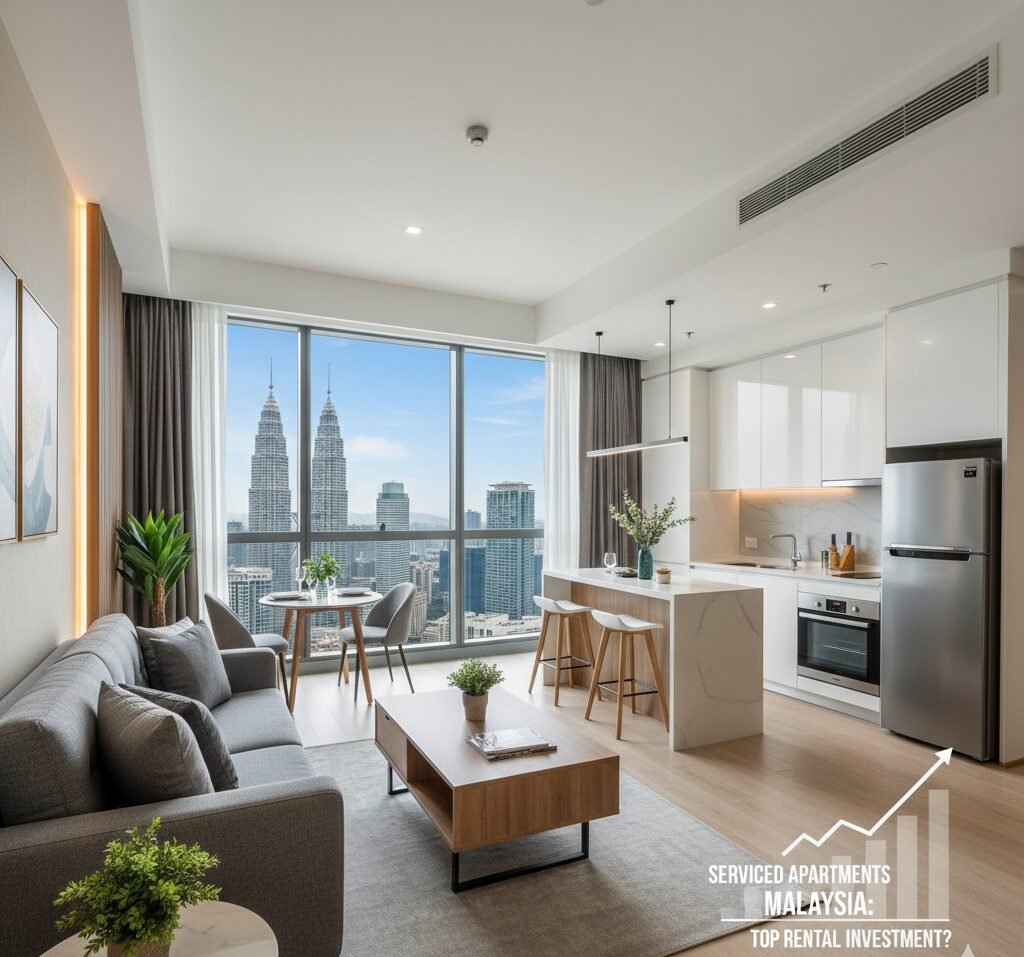Malaysian Real Estate Investment: The Ultimate Guide
Chapter 1: Why Invest in Malaysian Real Estate? The Unique Advantages
Real estate has always been a top choice for securing wealth. But why has Malaysia emerged as a leading destination for non-residents? The answer lies in a unique combination of economic, fiscal, and social factors that make it a far more attractive option than its Asian neighbors. For a broader overview of investing in the country, be sure to check out our complete guide: Investing in Malaysia in 2025: The Ultimate Guide.
Attractive Rental Yields and Strong Demand
Malaysia stands out with a dynamic rental market, especially in major urban areas like Kuala Lumpur, Penang, and Johor Bahru. The return on investment (ROI) for a rental property is significantly higher than in European markets. For instance, condominiums in business districts or near universities can generate gross yields ranging from 4% to 6% on average, a figure many investors consider excellent.
This profitability is fueled by a constant rental demand from a growing local middle class and a large number of expatriates, international students, and regional professionals.
Accessible Market Prices and Long-Term Appreciation Potential
One of the biggest barriers to entry for real estate investors is the initial cost. On this front, Malaysia is extremely competitive. For the same budget as a studio apartment on the outskirts of a major European city, you can acquire a modern, two-bedroom condominium with a swimming pool, gym, and 24/7 security in a sought-after Kuala Lumpur neighborhood.
Experts project long-term capital appreciation potential, particularly in areas benefiting from major infrastructure projects. The development of MRT lines, business centers, and tech hubs continues to drive property price appreciation, offering investors a dual source of income: rental yield and capital gains upon resale.
Political and Economic Stability with a Pro-Business Environment
A long-term investment requires stability. Malaysia, as a parliamentary democracy, has a history of political stability that reassures investors. Its legal framework, inherited from British common law, is robust and protects foreign property rights. Clear laws and well-maintained land registries ensure secure transactions.
Furthermore, the Malaysian government has implemented numerous measures to attract foreign investors, including tax incentives and a simplified purchasing process. The property buying process is straightforward and supervised by lawyers, which minimizes risks for non-residents.
In conclusion, real estate investment in Malaysia presents a unique opportunity to combine high profitability with legal security and long-term growth potential.
Useful Resources
To better understand the Malaysian property market and the opportunities available to foreign investors:
- Ministry of Economy – Guideline on the Acquisition of Properties (foreign ownership policy)
- NAPIC – Official property market data and statistics
- Expat.com – Practical guide for expats and investors in Malaysia
- World Bank – Malaysia country profile and economic insights
Chapter 2: The Legal and Tax Framework for Foreigners
The appeal of Malaysian real estate for non-residents isn’t just about its potential profitability; it’s also built on a clear and transparent legal and tax framework. For a secure investment, it is essential to understand the rules governing property purchase, ownership, and resale as a foreign citizen.
Minimum Purchase Price: A Key Requirement
To protect the local market and prevent price inflation in more affordable segments, the Malaysian government has set a minimum purchase price for non-residents. This amount is not uniform and varies significantly from one state to another.
- In Kuala Lumpur and the state of Selangor, the minimum price is RM 1 million (Malaysian Ringgit) per unit.
- In the state of Johor, the threshold can be RM 1 million, with exceptions for certain areas.
- In Penang, it’s RM 1 million for condominiums and RM 2 million for “landed properties.”
These thresholds are regularly reviewed. Therefore, it is crucial to verify the latest regulations with your real estate agent or lawyer before committing.
Restrictions on Property Types
As a foreigner, you are allowed to buy most types of properties, including condominiums, “serviced apartments,” and commercial properties. However, some restrictions apply:
- You are prohibited from buying properties on Malay Reserved Land.
- You cannot acquire low-cost or medium-cost properties, regardless of the state.
- Individual landed properties may be subject to restrictions in certain states.
Essential Taxes and Fees
The acquisition and resale of a property in Malaysia involve several key fiscal costs.
- Real Property Gains Tax (RPGT):This is a tax on capital gains from the resale of a property. The rate varies depending on the ownership period and your tax residency status. For a non-resident, the rate is fixed for the first five years.
| Years of Ownership | Tax Rate for Foreigners |
| Year 1 to 5 | 30% of the gain |
| Year 6 and above | 10% of the gain |
- Stamp Duty:This tax is due on the legal documents for the purchase (Sale & Purchase Agreement or SPA) and the loan. The rate is progressive and applies to the property’s purchase price.
- Legal Fees:Lawyer fees are regulated by the Malaysian Bar Council. They generally amount to about 1% of the purchase price.
Understanding these rules from the start allows you to budget your investment realistically and choose the best options for your financial goals. Adhering to these formalities is essential for securing your transaction and ensuring a sound, compliant investment.
Useful Resources
For detailed insights on regulations and legal conditions for property ownership by foreigners in Malaysia:
- LHDN – Inland Revenue Board of Malaysia (tax information and RPGT)
- KPKT – Ministry of Housing and Local Government
- Malaysian Bar – Official directory of lawyers in Malaysia
- Lexology – Legal analysis on property ownership by non-residents
Chapter 3: The Property Purchase Process in Malaysia
For many non-residents, the property purchase process in Malaysia might seem complex, but it is, in fact, well-defined and secure. The key to a smooth transaction lies in understanding each step and working with the right professionals. This chapter will walk you through the entire process, from finding your dream property to receiving the keys.
Step 1: Research, Property Search, and Offer
Your investment journey begins with thorough research and finding a suitable property. Work with a licensed real estate agent who specializes in foreign clients. They can guide you through the local market, ensuring the properties you consider meet the minimum purchase price for foreigners in the relevant state and are not subject to other ownership restrictions.
Once you have chosen a property, you will make a formal offer by signing a booking form or an offer letter and paying an “earnest deposit,” which is typically 2-3% of the purchase price. This deposit is held by the agent or the developer’s lawyer and confirms your serious intent to buy.
Step 2: Appoint a Lawyer and Sign the SPA
This is the most critical step. Immediately after your offer is accepted, you must appoint a qualified property lawyer (known as a “conveyancing lawyer”). The lawyer will:
- Conduct due diligence: They will perform legal searches to verify the property’s title and ensure it is free from any encumbrances or legal disputes.
- Draft and review the Sale & Purchase Agreement (SPA): This is the main legal document outlining the terms of the sale, payment schedule, and conditions. You must sign the SPA within a specific period (usually 14 days) from the date of the offer and pay the remaining deposit to reach a total of 10% of the purchase price.
Step 3: State Authority Consent
For all foreign property purchases, obtaining consent from the relevant state authority is mandatory. Your lawyer will prepare and submit the application on your behalf. This step is a key formality and can be the most time-consuming part of the process, often taking anywhere from 1 to 6 months depending on the state and the property type.
Step 4: Finalization of the Transaction and Handover
Once the state authority consent is approved, the final phase begins. You will need to settle the remaining balance of the purchase price (90%) within the timeline stipulated in the SPA, typically 3 months from the date of the consent approval.
This is also when you will pay the necessary taxes, such as Stamp Duty on the SPA and the Memorandum of Transfer (MoT), and legal fees. After all payments are confirmed, your lawyer will proceed with the transfer of the title deed into your name at the land office. Once the ownership is successfully registered, you will receive the keys to your new property.
Common Pitfalls to Avoid
While the process is secure, being aware of potential issues can save you time and money.
- Property Quality: For new developments, conduct a thorough inspection before the handover to identify any defects.
- Currency Fluctuations: Be mindful of exchange rate volatility between your home currency and the Malaysian Ringgit (MYR), especially during the payment period.
- Hidden Costs: Make sure your budget accounts for all additional fees, including legal fees, stamp duty, and potential property management fees.
With a clear understanding of these steps and the support of a reputable lawyer, you can navigate the Malaysian real estate market with confidence and secure a promising investment.
Useful Resources
To get authoritative, step-by-step official guidance on the property purchasing process in Malaysia:
- Ministry of Economy – Division responsible for Property Acquisition Guidelines
- NAPIC – Unsold Property (Overhang) Dashboard
- Malaysian Bar – Official directory of lawyers in Malaysia
- KPKT – Ministry of Housing and Local Government
Chapter 4: Investment Strategies & Property Management
Once you have a firm grasp of the legal and purchasing process, the next step is to define your investment strategy. A successful real estate venture isn’t just about buying a property; it’s about making it work for you. This chapter explores the primary investment approaches and outlines why professional management is essential for non-resident owners.
Primary Investment Strategies
Your choice of property and location will depend heavily on your investment goals. Here are the most common strategies in the Malaysian market:
- Buy-to-Let for Rental Income: This is the most popular strategy for foreign investors. The goal is to generate a stable, passive income stream.
- Long-Term Rentals: Ideal for investors seeking consistency and minimal day-to-day involvement. Properties in well-connected urban areas attract professionals, expatriates, and local families.
- Short-Term Rentals (e.g., Airbnb): This can offer higher returns but requires a more hands-on approach. It works best for properties in tourist hotspots or central business districts with a high turnover of visitors. This strategy may also be subject to specific local regulations.
- Capital Appreciation: This long-term strategy focuses on profiting from the resale of the property. Key drivers of appreciation include:
- Infrastructure: Properties located near new or expanding MRT/LRT lines, highways, or high-speed rail projects often see significant value increases.
- Urban Development: Investing in neighborhoods undergoing regeneration or a building boom can be highly profitable.
- Strategic Location: Properties in proximity to international schools, universities, or business parks have consistent demand, which supports long-term value.
The Crucial Role of Professional Property Management
For non-resident investors, hiring a professional property manager is not a luxury—it’s a necessity. A reliable manager acts as your local representative, handling all aspects of your investment. Their services typically include:
- Tenant Sourcing and Vetting: They handle property listings, screenings, and background checks to find reliable tenants.
- Rent Collection and Financial Reporting: They ensure timely rent payments and provide you with regular financial statements, simplifying your accounting.
- Maintenance and Repairs: From minor fixes to major issues, they manage all property upkeep, ensuring your asset remains in excellent condition.
- Legal and Administrative Compliance: They handle tenancy agreements, security deposits, and legal notices, ensuring full compliance with Malaysian tenancy laws.
A standard management fee is typically between 5% to 10% of the monthly rental income. This cost is a worthwhile investment that protects your asset and provides peace of mind.
Key Investment Hotspots
- Kuala Lumpur: As the capital and economic heart of the country, KL offers a diverse market. High-end condominiums in areas like Mont Kiara, KLCC, and Bangsar are highly sought after by expatriates, guaranteeing strong rental yields.
- Penang: Known for its tech industry and rich cultural heritage, Penang is a dual-purpose market. Properties in George Town and Batu Ferringhi appeal to tourists for short-term rentals, while those in Bayan Lepas attract a professional workforce from the “Silicon Valley of the East.”
- Johor Bahru: Its strategic location right next to Singapore makes it a key commercial and residential hub. Many Singaporeans and cross-border workers look for more affordable housing here, creating consistent demand. Areas like Iskandar Puteri are prime for growth due to major development projects.
By selecting the right strategy and location, and by securing professional management, you can effectively manage your Malaysian real estate investment from anywhere in the world and ensure its profitability.
Useful Resources
For precise computation of acquisition, ownership, and financing costs of property investment in Malaysia:
- LHDN – Official property taxation guidelines
- Bank Negara Malaysia – Foreign exchange and economic policy (e.g., Malaysian Economy in Figures PDF)
- Maybank – Mortgage and home financing options
- CIMB – Home loans tailored for foreigners
Conclusion: A Strategic Investment with a Bright Future
Investing in Malaysian real estate is more than just a transaction; it’s a strategic move into a market with substantial growth potential. By understanding the advantages, navigating the legal framework, and following a clear process, you position yourself to build a profitable and secure portfolio in one of Asia’s most dynamic economies. This guide has provided you with the foundational knowledge to embark on this journey with confidence.
A Summary of Strategic Advantages
Let’s quickly recap the key strengths that make Malaysia a top destination for foreign investors:
- Economic and Political Stability: A resilient economy, supported by a diverse market and pro-business government policies, provides a solid foundation for long-term investment.
- Attractive Yields and Accessibility: Malaysia offers significantly higher rental yields compared to many Western markets, with a lower entry price point, making it highly accessible.
- Legal Clarity and Protection: A transparent legal system based on British common law, coupled with clear property ownership regulations and government oversight, ensures your investment is well-protected.
- Simplified Process: While the process involves key administrative steps like obtaining state consent, the structured and professional nature of the transaction minimizes risks and simplifies the journey for non-residents.
The Path to Success: Professional Support and Due Diligence
The most successful investors are those who rely on a strong network of local professionals. Whether it’s a licensed real estate agent, a trusted conveyancing lawyer, or a diligent property manager, their expertise is invaluable. They are your eyes and ears on the ground, ensuring every step, from property selection to daily management, is handled with precision and in full compliance with local laws. The investment in their services is an investment in your peace of mind and the long-term health of your asset.
A Promising Outlook for Your Portfolio
The future of the Malaysian real estate market remains bright. With ongoing infrastructure projects, continued urban development, and a growing population of young professionals, the demand for quality housing and commercial property will only increase. By investing now, you are not just acquiring an asset; you are becoming a part of a country’s promising growth story.
Your decision to invest in Malaysian real estate is a choice for stability, profitability, and an advantageous long-term outlook. We wish you every success in your investment journey.





